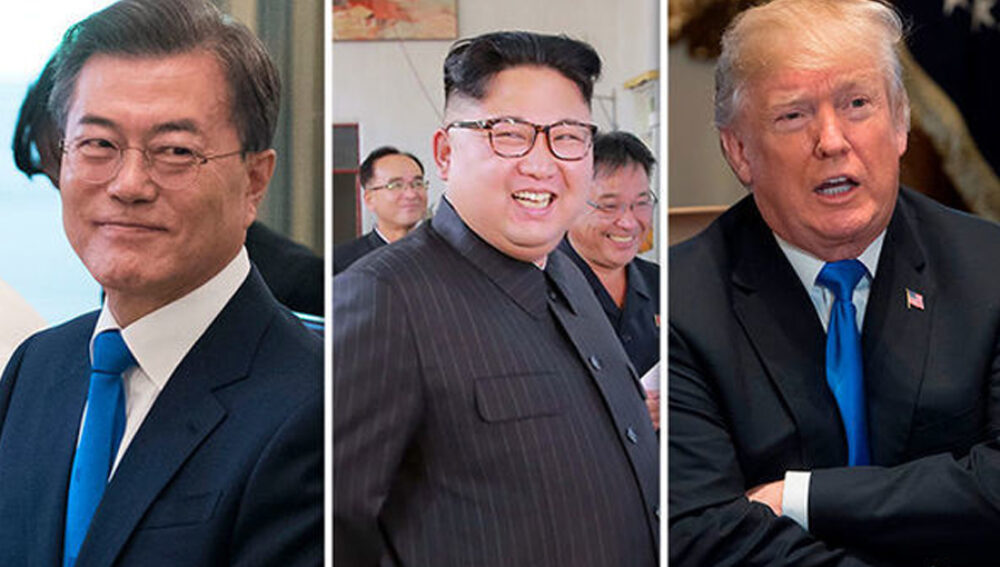North Korea’s announcement last weekend that it has suspended its nuclear and missile testing programs is one more sign the country’s attempt to remould its image as the world’s leading pariah state in favour of a fully engaged international interlocutor is well under way.
After a recent flurry of international activity, a series of high-level summits are scheduled, starting with an inter-Korean meeting this Friday between South Korean President Moon Jae-in and North Korean leader Kim Jong-un. Then in a highly anticipated move, Donald Trump intends meeting with Kim Jong-un. Trump’s nominee for Secretary of State and former CIA chief, Mike Pompeo, met Kim over Easter to map out the US-North Korea summit agenda.
The stakes for Australia are high. North-east Asia is home to three of our largest trading partners (China, Japan and South Korea) and the region accounts for well over half of Australia’s merchandise exports.
Canberra has historically been a low-profile but active player in Korean Peninsula diplomacy. Australia is one of the few Western countries to have established formal diplomatic relations with North Korea, for short periods during the 1970s and the 2000s. During the second of these two periods, the Howard government offered Pyongyang an energy deal, including coal shipments, as a quid pro quo for North Korea returning to the negotiating table. And early in his prime ministership, Kevin Rudd even advocated Australian membership of the Six Party Talks, a high-powered grouping convened to solve the protracted North Korean crisis.
However, within the Australian policy community today there is a worrying lack of “entrepreneurial space” to develop and implement diplomatic initiatives. Government agencies and their staff appear preoccupied with, if not absolutely overwhelmed by, preparing for the next multilateral gathering or reacting to President Trump’s latest tweet. Likewise, Australia’s think tanks and universities apparently lack the requisite resources to effectively support middle power diplomacy in a geopolitical climate that is unprecedented in terms of its speed and scale.
Key challenge
For the Australian policy community, the key challenge is to move beyond merely reacting to events on the Korean Peninsula. This requires not only more detailed engagement with the issues at hand, such as how to effectively freeze and reduce North Korea’s WMD programs, but also a greater willingness to engage in what might be termed “over-the-horizon” analysis outside the lens of US thinking.
What are Australia’s long-term strategic goals on the Korean Peninsula? Should we be seeking to support South Korea’s approach to engaging with the North, even if this clashes with US and Chinese preferences? Should Australia develop its own bilateral dialogue with Pyongyang to promote its own unique interests on the peninsula? The Australian policy community should be focusing on an integrated long-term strategic approach if we want to avoid being treated as a bystander in a rapidly changing geopolitical environment on the Korean Peninsula.
None of this is to suggest that there is no role for Australia to play at the present critical juncture.
Australia has already contributed to creating the atmosphere needed for diplomacy by supporting the Trump administration’s “maximum pressure” campaign against North Korea, particularly in relation to the tightening of UN sanctions. As the diplomatic phase of this campaign now gets under way, there remains an important role for Canberra in encouraging the US and its allies to maintain a similar level of multilateral coordination regarding bilateral interactions with the North. Pyongyang has, after all, proven in the past to be a master of “divide and conquer” diplomacy and US allies are rightly anxious that Trump may cut a deal with Pyongyang that leaves them stranded.
As the summitry unfolds, Canberra needs to anticipate the full range of possible outcomes. Given the potential for the summits to yield little or nothing in terms of commitments, the Turnbull government must prepare for worst-case scenarios, including war on the peninsula. In addition to the delicate subject of whether Australia should support a US first-strike against North Korea, basic questions about whether the 15,000 Australian citizens in South Korea could be evacuated in an emergency must be addressed.
Grand bargain
More positively, should some form of grand bargain be struck that supports regional stability, Canberra must be ready to contribute to the financing of that arrangement if the opportunity arises. There is precedent here given the role Australia played as a contributor to the Korean Energy Development Organisation (KEDO), which was established to implement the 1994 Agreed Framework between the US and North Korea.
Creative and ambitious strategic thinking is required about how best Australia can add value to the evolving security situation on the Korean Peninsula. As a first step, the Turnbull government should begin a whole-of-government review, managed by the Department of Foreign Affairs and Trade, to identify and implement policy initiatives that ensure a distinctly national approach to safeguarding Australia’s long-term interests on the Korean Peninsula, including possible bilateral relations with North Korea.
Australia’s prosperity and security are intimately tied to the future of north-east Asia. What happens on the Korean Peninsula is critical to its own economic and geopolitical future.
Andrew O’Neil is Professor of Political Science at Griffith University; Brendan Taylor is Associate Professor of Strategic Studies at the Australian National University; and William T. Tow is Professor of International Security at the ANU. They are the authors of the Centre of Gravity Paper Australia and the Korean crisis: confronting the limits of influence? released this week with funding support from the Australia-Korea Foundation.
This article originally appeared in the Australian Financial Review.








